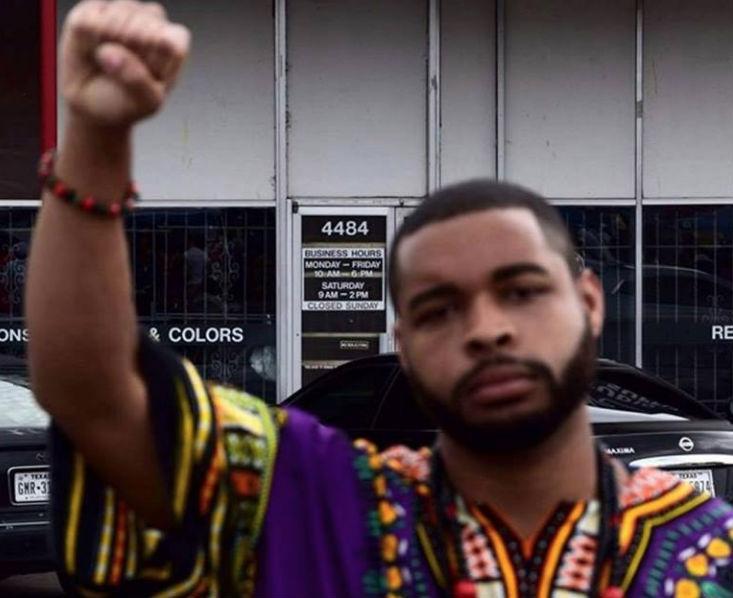Dallas police shooter Micah Johnson was accused of sexually harassing female soldier in Afghanistan
His alleged victim told superiors that he should seek 'mental help'

Your support helps us to tell the story
From reproductive rights to climate change to Big Tech, The Independent is on the ground when the story is developing. Whether it's investigating the financials of Elon Musk's pro-Trump PAC or producing our latest documentary, 'The A Word', which shines a light on the American women fighting for reproductive rights, we know how important it is to parse out the facts from the messaging.
At such a critical moment in US history, we need reporters on the ground. Your donation allows us to keep sending journalists to speak to both sides of the story.
The Independent is trusted by Americans across the entire political spectrum. And unlike many other quality news outlets, we choose not to lock Americans out of our reporting and analysis with paywalls. We believe quality journalism should be available to everyone, paid for by those who can afford it.
Your support makes all the difference."Have a safe summer," reads a sign at the entrance to John D Horn high school in Mesquite, Texas, from which Dallas gunman Micah Johnson graduated in 2009.
The man who this week shot dead five police officers before being killed by police using a remotely controlled explosive device, was already a member of the Junior Reserve Officer Training Corps when he left school.
By 2013, as a full-blown reservist, he was deployed to Afghanistan as a mason and carpenter with the US Army’s 420th Engineer Brigade. He is not believed to have seen combat, though he was awarded an Army Achievement Medal and a Nato Medal. Yet whatever his state of mind when he left for the Middle East, he returned to the US the following year a troubled man.
A private first class, Johnson was given an honourable discharge from the Army in May 2015 and moved back in with his mother. His departure was reportedly preceded by sexual harassment charges from a female soldier with whom he served in Afghanistan, who allegedly told superiors that he should seek “mental help”. It is unclear whether he did so.
Police who searched the Johnsons’ two-storey home in Mesquite – a quiet, lower middle-class Dallas suburb made up mostly of flat green fields, modest brick homes and chain fast-food outlets – found a cache of bomb-making materials, firearms and a “personal journal of combat tactics.” He is thought to have frequented gun ranges.
Bradford Glendening, a military lawyer assigned to represent Johnson after he returned from Afghanistan, told the New York Times that his Army superiors “didn’t like him, that was very clear”. Yet Sarah Castañeda, a woman who served alongside Johnson, described him in a Facebook post as “my battle buddy, my brother in arms.”
In a recent CV, Johnson reportedly said that since returning to civilian life, he had worked with the “mentally challenged” for the organisation Touch of Kindness, and as a shift manager at a sandwich shop, Jimmy John’s. Caitlyn Lennon, a 27-year-old former co-worker at the shop, told the Dallas Morning News that she knew him as a gun owner who was “distrustful of the police".
Meanwhile, he identified himself as a black nationalist on Facebook, where his profile photo depicted him wearing a dashiki with his fist aloft in a black power salute. He had also “liked” the New Black Panther Party and the Black Riders Liberation Party, which have been described as hate groups by the Anti-Defamation League and the Southern Poverty Law Centre.
Another group featured on his page, the African-American Defense League, was formed in 2014 by activist Mauricelm-lei Millere, who regularly attempts to incite violence against the police using social media. During his stand-off with police on Thursday night, Johnson said he “wanted to kill white people, especially white officers”, according to Dallas Police Chief David Brown.
He was eventually killed in the covered car-park in downtown Dallas where he had been cornered by police. After police attempts to negotiate failed, a so-called bomb robot – like those used routinely by US forces in Iraq – was sent in and detonated, the first time law enforcement has used such a device with deadly force on US soil.
Until the attacks on Thursday, Johnson had no criminal record and was not thought to have had any direct links to terror groups, the Los Angeles Times reported. But Israel Cooper, a friend with whom Johnson regularly played basketball in a Mesquite Park, told the Associated Press, “It’s the quiet ones that just do the most devastating stuff.”